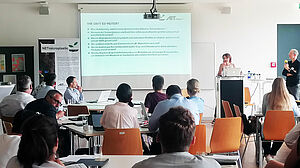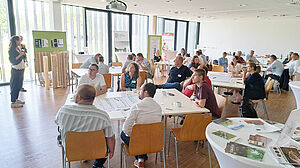On 27 June 2024, the Roadmap Consultation Workshop on the reduction of microplastics in agricultural soils took place in Tulln. The workshop, organised by AIT, developed strategies and measures to combat microplastic pollution. Experts from science, agriculture and industry worked together to develop solutions to minimise the input of microplastics into soils and promote sustainable agriculture.
Microplastics in our soils - an invisible danger
Microplastics pose a serious threat to the ecology of agricultural soils. In her presentation, Helene Walch from the Federal Environment Agency in Vienna reported on the results of nationwide soil analyses, which revealed widespread plastic contamination. Areas used for agriculture, such as fields and grassland, showed high levels of microplastic contamination, while the contamination is even higher in leisure and transport areas. In addition to tyre abrasion, the main sources of contamination are inputs from sewage sludge, compost, farm manure and the use of plastic in agriculture. Possible negative effects of microplastics on soil quality and possible uptake by plants are a cause for concern.
Together against microplastics - innovative ideas and strategies
The workshop in Tulln aimed to develop concrete measures to reduce microplastics in the soil. Workshop leader Claudia Preininger, AIT Competence Unit Bioresources of the Centre for Health and Bioresources, presented findings from research, surveys and interviews that looked at knowledge about microplastics and the use of plastic in agriculture. The results showed that although many farmers and students are well informed, there is still a considerable need for action. "We must continue to raise awareness of the problem of microplastics in soils and develop practical solutions," emphasised Preininger. Various solutions were developed during the discussions. These included improving the collection processes for organic waste, sensitising the general public to the handling of plastic and developing new, degradable products. Another focus was on optimising composting in order to separate plastic more efficiently. Preininger added: "It is crucial that we find innovative and practicable measures that are supported by all stakeholders."
Network for innovative solutions
A highlight of the workshop was the marketplace, where numerous companies and organisations presented innovative approaches and technologies. Among the exhibitors were Witasek Pflanzenschutz GmbH, AGRANA Research & Innovation Center GmbH, Lenzing AG, Bündnis Mikroplastikfrei, RECENDT GmbH, FiBL Austria, Innovation-Farm Edtbauer.OG, Ecoplus and TIMAC AGRO Düngemittelproduktions- und HandelsgmbH. The presentations conveyed a strong commitment on the part of a wide range of stakeholders to curbing microplastics.
Vision for the future - careful handling of plastic in agriculture
The measures developed are to be incorporated into the development of a comprehensive roadmap that will serve as a guide for social fields of action. AIT will continue to play a leading role in the research and development of sustainable solutions aimed at preventing microplastics in the soil. Through cooperation with various stakeholders from science, agriculture and industry, the implementation of the measures is to be driven forward and a contribution made to the sustainable management of agricultural land.
Further information can be found at: https://www.net-microplastic.eu/
Once finalised, the document can be requested at: info(at)net-microplastic.eu




